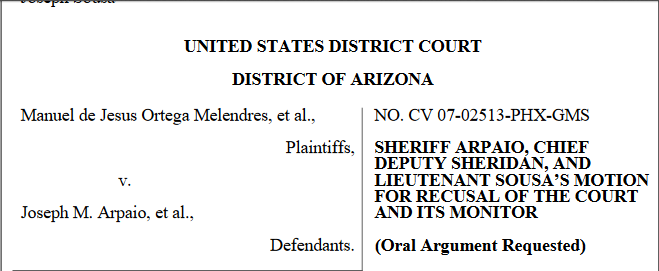ATTORNEYS CLAIM EX PARTE COMMUNICATIONS BETWEEN MONITOR AND JUDGE “THE TIP OF AN ICEBERG”
by Sharon Rondeau
 (Oct. 29, 2016) — On Wednesday, the Washington, DC-based law firm of Cooper & Kirk, PLLC and the Arizona law firm, Jones, Skelton & Hochuli, PLC, which defended Maricopa County Sheriff Joseph M. Arpaio in civil contempt hearings last year filed a motion seeking an order removing U.S. District Court Judge G. Murray Snow from future proceedings as well as to “terminate” the monitor Snow appointed to oversee the sheriff’s office in 2014.
(Oct. 29, 2016) — On Wednesday, the Washington, DC-based law firm of Cooper & Kirk, PLLC and the Arizona law firm, Jones, Skelton & Hochuli, PLC, which defended Maricopa County Sheriff Joseph M. Arpaio in civil contempt hearings last year filed a motion seeking an order removing U.S. District Court Judge G. Murray Snow from future proceedings as well as to “terminate” the monitor Snow appointed to oversee the sheriff’s office in 2014.
The two sets of attorneys claim that Snow and the monitor have exchanged ex parte communications which have influenced Snow’s decisions in the case.
Snow is referred to in the brief as “the Court,” while Arpaio is the Defendant and “non-party Movants” are identified as Chief Deputy Gerard Sheridan and Lt. Joseph Sousa.
The monitor is Robert Warshaw of Warshaw & Associates and Police Performance Solutions, LLC, an experienced law enforcement professional who has acted as monitor to the Oakland, CA Police Department and Niagara Falls Police Department.
Invoices for Warshaw’s team’s services range between five and six figures each month and are ultimately paid by taxpayers.
In June of last year, Snow wrote in an order involving a bill dispute between Warshaw and Maricopa County that he was “in constant communication” with Warshaw. “The Court has regular, almost daily meetings with the Monitor when he is in Maricopa County, and frequent contact regarding developments and inquiries when he is not,” Snow wrote.
In his May 15, 2014 order, Snow prohibited Maricopa County Deputy County Manager from discussing “or permitting access to any information concerning any aspect” of Warshaw’s monthly invoices.
In May, Snow found Arpaio and three subordinates, one of whom had retired from the Maricopa County Sheriff’s Office (MCSO), to have been in civil contempt of court for allegedly defying his orders in a long-running civil rights case filed in December 2007. “The Court thus finds that Arpaio is in civil contempt and additionally finds that Arpaio’s contempt was both knowingly and intentional,” Snow wrote in a decision issued on May 13.
Arpaio, 84, has served six consecutive terms as the county’s chief law enforcement officer and is seeking re-election on November 8. On Tuesday, the same day on which early voting began in Arizona, the U.S. Department of Justice announced that it would pursue a criminal contempt charge recommended by Snow over the summer.
A trial date on the criminal contempt charge has been set for December 6. Arpaio has pleaded “not guilty,” and another of his defense attorneys, Mel MacDonald, has asked for a continuance of at least 120 days.
Arpaio believes the Justice Department’s prosecution of him to be politically-motivated based on his stance on illegal aliens as stated in a campaign advertisement released on Friday.
On page 7 of their brief, the attorneys wrote that “ex parte communications…involved the Monitor privately reporting to the Court information that the Monitor learned as a result of its ex parte communications with, and investigations of, Movants and other officers and employees of the Maricopa County Sheriff’s Office (MCSO).”
In their filing, the attorneys presented a number of cases in which appellate courts had ruled that ex parte communications have necessitated the recusal of the judge found to have participated in such exchanges, including Guenther v. Comm’r, 889 F.2d 882, 884 (9th Cir. 1989) (Guenther I), Kensington Int’l, Ltd., 368 F.3d 289, 318 (3d Cir. 2004) (Kensington II); and Edgar v. K.L., 93 F.3d 256, 262 (7th Cir. 1996).
On page 8, the attorneys stated that they are not seeking to nullify any previous decisions rendered by Snow. “Movants have contemporaneously requested leave to file a separate motion seeking discovery into the full scope and content of the Court’s ex parte communications, so that Movants may determine whether such vacatur is warranted. The law is clear that, in circumstances like this case, Movants are entitled to discovery into the full scope of ex parte communications between the Court and the Monitor,” they wrote.
On pages 13-35, the attorneys cite and expound upon “four separate legal and ethical guarantees” which preclude communications “about the merits between the Court and the Monitor.”
On page 29, the attorneys termed the ex parte communications “disclosed by the Court on the record” as “likely…the tip of an iceberg.”


